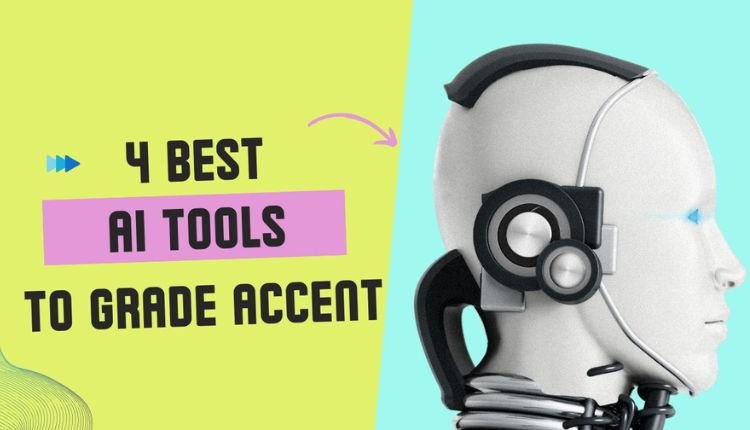Powerful AI Tools to Grade Accent: Enhance Pronunciation Accuracy
Imagine you’re in an international conference, presenting your groundbreaking idea. Despite your hard work, the audience struggles to understand your accent. This is a familiar scenario for millions of non-native English speakers worldwide, as pronunciation barriers can hinder clear communication and understanding.
Pronunciation is more than just speaking correctly; it’s about being understood and making meaningful connections. While traditional methods like in-person coaching or language tapes have their place, they often lack the precision and instant feedback necessary to address the nuances of accent and pronunciation.
This is where AI tools to grade accent step in. By leveraging advanced technologies like machine learning and phoneme analysis, these tools offer precise, actionable feedback in real-time. They don’t just bridge the communication gap; they empower learners to improve, one syllable at a time. Let’s dive into how these tools work, their key features, and how they’re transforming education, corporate training, and beyond.
The Role of AI in Language Learning
AI’s Revolutionary Impact on Language Education
Artificial intelligence has redefined how people learn languages by offering personalized and scalable solutions. Gone are the days when language learning meant following a static curriculum. With AI, learning adapts to the individual, ensuring each student’s unique needs are addressed.
For instance, Duolingo and Rosetta Stone have incorporated AI-driven speech analysis to help users refine pronunciation. These tools adjust the difficulty level based on learner performance, ensuring gradual progress and avoiding frustration.
A 2023 study by the University of Cambridge found that integrating AI-powered pronunciation tools into language curricula improved learners’ speech clarity by 47%. Tools such as these have made language learning more interactive, bridging gaps that traditional classroom settings often miss.
How AI Grades Pronunciation with Accuracy
AI tools work by dissecting spoken language into components like pitch, tone, and rhythm. By comparing these with native-speaker benchmarks, they identify discrepancies in pronunciation. This precise feedback enables learners to focus on specific problem areas, such as mispronounced vowels or misplaced stresses.
Curious about how AI is enhancing user experiences across sectors? Explore our piece on AI and customer experience.
Features of AI Tools to Grade Accent
1. Real-Time Feedback
One of the most powerful features of these tools is their ability to provide immediate feedback. Tools like Elsa Speak highlight pronunciation errors as soon as they’re made, offering suggestions to correct them.
Practical Tip: Practice daily with short sessions to build muscle memory for proper articulation. Consistent use of AI tools helps create lasting improvements.
2. Phoneme-Level Analysis
Tools like SpeechAce break speech into its smallest components—phonemes. By doing so, they can pinpoint exactly where a user goes off track. This level of analysis is critical for identifying and fixing subtle pronunciation errors that might be overlooked in traditional language learning settings.
Case Study: A study conducted by EdTech Research Group revealed that phoneme-focused learning improved language learners’ pronunciation accuracy by 60% within 8 weeks.
3. Customization for Native Languages
AI tools often tailor lessons to address the specific pronunciation struggles of different native language speakers. For example, Japanese learners often struggle with differentiating “L” and “R” sounds, while Arabic speakers might mispronounce vowels like “ee” and “ih.”
Pro Tip: When choosing a tool, opt for one that supports accent-specific learning for targeted improvement.
4. Gamification and Progress Tracking
Gamified elements like streaks, quizzes, and badges make learning enjoyable. Tools such as FluentU use engaging videos combined with real-world scenarios, keeping learners motivated while tracking their improvement over time.
For a deeper dive into how AI personalizes user experiences, check out our article on AI personal assistants.
Top AI Tools to Grade Accent

1. Elsa Speak
Elsa Speak stands out for its sophisticated algorithms that provide tailored guidance. The app has helped millions worldwide master their accents.
Key Features:
- Advanced speech recognition powered by AI to analyze pronunciation.
- Offers real-time feedback on word stress, intonation, and fluency.
- Tailored lessons based on user performance for personalized improvement.
Success Story: A student from Vietnam preparing for international job interviews improved her accent significantly within three months, boosting her confidence and employability
2. SpeechAce
Known for its professional-grade feedback, SpeechAce is a favorite among educators and corporate trainers.
Key Features:
- Specializes in evaluating pronunciation accuracy for learners of English.
- Uses proprietary AI algorithms to assess phonetics and fluency.
- Provides visual and audio feedback to help users identify improvement areas.
Success Story: Language institutes in Europe have integrated SpeechAce into their curriculum, reporting a 25% improvement in students’ pronunciation accuracy within six months
3. Pimsleur Voice Coach
Pimsleur Voice Coach combines AI technology with Pimsleur’s proven language-learning methodology to focus on accent improvement and conversational fluency.
Key Features:
- AI-driven feedback that adjusts to the user’s accent and learning progress.
- Focused on improving conversational clarity and fluency.
- Tailored practice sessions for different skill levels and languages.
Success Story: A French entrepreneur refined her English accent using Pimsleur Voice Coach within six months, leading to smoother client communications and increased business opportunities globally.
4. Accent Training App by Speechmatics
This app specializes in deep learning models, catering to various accents and linguistic challenges.
Key Features:
- Advanced AI-powered phonetic analysis for detailed feedback.
- Supports multiple languages and accents, offering broad accessibility.
- Tracks progress with detailed reports to guide continuous improvement.
Success Story: A team of ESL instructors in South Korea adopted the app in their training programs, resulting in a 30% improvement in students’ pronunciation scores over three months.
Honorable Mentions: Pronunciation Coach and Mondly offer strong support but may lack the advanced grading metrics of tools like SpeechAce or Elsa Speak.
How AI Tools Enhance Pronunciation Accuracy
Personalized Learning Paths
AI tools customize lessons to match a user’s unique challenges. For instance, if someone consistently mispronounces “th” sounds, the tool may prioritize drills for that phoneme.
Example: A Spanish speaker struggling with English vowels would receive exercises targeting these sounds.
Accuracy Through Repetition
AI tools encourage practice and repetition, which is key to mastering pronunciation. A study by the Journal of Educational Technology highlights that repetition using AI tools increases accuracy by up to 50%.
Pro Tip: Set aside at least 15 minutes daily for focused practice with AI tools to accelerate improvement.
Inclusivity Across Languages
AI accent grading tools cater to diverse linguistic needs, ensuring that learners from all backgrounds receive relevant and effective feedback.
Insight: Many tools now integrate support for underrepresented accents, making them more inclusive and globally relevant.
Real-World Applications of AI Accent Grading Tools
In Education
Schools and universities are adopting AI tools to help non-native English speakers gain fluency. Platforms like Edmodo integrate accent grading to improve overall language competency.
Explore more about AI in education and its impact.
In Corporate Training
Clear communication is vital for global businesses. AI tools are increasingly used to train employees in customer service, sales, and leadership roles.
In Speech Therapy and Accessibility
Speech therapists use AI tools to assist individuals recovering from speech disorders or strokes.
Example: A patient recovering from aphasia used an AI-based tool to regain 70% of their speaking ability in less than a year.
Challenges and Limitations of AI Accent Grading
Bias in Training Data
One common issue is bias in training datasets, where certain accents receive better recognition than others. For example, tools trained predominantly on American or British accents may struggle with regional dialects.
Over-Reliance on Technology
While AI tools are helpful, over-dependence can hinder learners from practicing conversational nuances in real-life interactions.
Cost and Accessibility
Advanced tools like Elsa Speak often come with premium pricing, limiting their accessibility for learners in developing regions.
To explore ethical concerns related to AI, read our article on AI’s ethical considerations.
Future Trends in AI Accent Grading Tools

AI accent grading tools are undergoing remarkable transformations, thanks to continuous advancements in technology. Below are key future trends shaping the industry:
Personalized Learning Experiences
Future AI tools are set to offer highly personalized feedback, adapting to the user’s specific needs. Leveraging real-time auditory analysis, they can pinpoint pronunciation errors and suggest tailored corrections, enabling users to make precise and effective improvements.
Enhanced Understanding of Linguistic Nuances
Deep learning algorithms are expected to improve tools’ ability to recognize regional accents and subtle variations in pronunciation. This reduces biases and ensures fair assessments, especially for non-native speakers with unique linguistic traits.
Immersive Technologies for Pronunciation Practice
AI-driven tools are likely to integrate AR and VR, creating real-world conversational simulations. This immersive approach allows users to practice accents dynamically in lifelike settings, significantly enhancing learning outcomes.
Multilingual and Cross-Linguistic Capabilities
With improved cross-linguistic features, future tools will seamlessly support diverse languages and dialects, making them accessible to a global audience.
Ethical and Inclusive AI Development
To address biases, tools will prioritize transparency and inclusivity, ensuring ethical methodologies while maintaining accuracy and effectiveness.
These innovations promise to revolutionize how we learn accents, making AI tools indispensable for learners, educators, and professionals worldwide
Conclusion: The Key to Clearer Communication
AI tools to grade accent are transforming how we approach language learning. They offer precise, actionable insights that empower learners to communicate confidently, whether in classrooms, boardrooms, or social settings.
To maximize the benefits of these tools:
- Choose one tailored to your specific needs.
- Dedicate time for consistent practice.
- Balance AI-based learning with real-world conversations.
Language is the gateway to connection, and mastering pronunciation is the key to unlocking that gateway. Whether you’re learning English for professional growth or personal fulfillment, AI-powered tools are here to guide you every step of the way.
Have you explored any of these tools? Share your journey in the comments below—we’d love to hear how you’re making progress!
FAQs
Is AI 100% accurate?
AI is not 100% accurate. While it can process data efficiently and identify patterns, AI tools operate on probabilistic models, leading to errors and biases. Factors like training data quality and algorithm limitations affect their reliability.
Is there an AI for grading?
Yes, several AI tools are designed for grading, such as Turnitin and Gradescope. These tools analyze essays or assignments for grammar, structure, and even originality. However, they should complement human evaluation to ensure fairness and accuracy.
Can ChatGPT grade essays?
ChatGPT can provide feedback on essays, focusing on grammar, style, and structure. However, its analysis lacks the depth required for holistic grading, such as understanding nuanced arguments or creativity, making it best suited as a supplementary tool.
How accurate is ChatGPT grading?
ChatGPT grading accuracy depends on the evaluation criteria. While it can assess language and structure effectively, it struggles with subjective elements like argument strength or creativity. Thus, its results should be reviewed by a human grader for validation.
Which grading method is the fastest?
AI-assisted grading methods, like those in Turnitin or ChatGPT, are the fastest, handling large volumes quickly by automating repetitive tasks. However, combining AI with human review ensures a balance between speed and grading quality.







